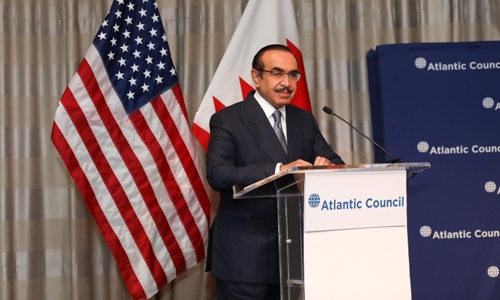Minister calls for greater US ties to fight ‘smart terrorism’
Interior Minister, General Shaikh Rashid bin Abdullah Al-Khalifa yesterday called for greater US-Bahrain cooperation to counter the growing threats posed by terrorist organisations in the era of “smart terrorism”. “Terrorist group today works with sophisticated weapons and communication system,” the minister said warning that they are now capable of conducting operations with minimal physical risk.
Facing such threats, the Minister stressed, requires greater and deeper US-Bahrain cooperation and is also essential to counter the destabilising influence of Iran and its sectarian and terrorist allies and to preserve the security of the Gulf and beyond. The minister was speaking during a meeting on “US Counterterrorism and Law Enforcement Cooperation in the Middle East” at the Atlantic Council in the United States.
Discussions focused on the security challenges facing the Gulf region that require confronting the Iranian Interference and combating all forms of Iranian support to terrorist groups. The event highlighted cybersecurity and the threat of the use of technology in terrorism and the need to improve the capabilities of security authorities to deal with the development in cross-border organised crimes, in addition to the exchange of information and the reinforcement of international counter-terrorism cooperation.
Iran’s proxy war
Iran, the Minister told the meeting, is waging a proxy war to undermine the region’s safety and stability and “ultimately to seize power and impose a Hezbollah -style clerical regime.” “This strategy has played out clearly elsewhere in the region, with countries paralysed, and Hezbollah holding key centres of power,” the minister said adding that they have tried the same game plan in Bahrain. “They have not succeeded, and we will not let them succeed,” the minister said. In Bahrain, the minister said, “There was a genuine hope that so-called opposition groups could work constructively – taking part in elections and engaging productively to develop their country.” “But those groups slipped into a familiar pattern of rejectionism, of boycotts, of more extreme demands, and ultimately of street violence and intimidation. “It also became clear that Al-Wefaq National Islamic Society was little more than the Bahrain franchise of Hezbollah.”
Terrorist designation
Highlighting the designation of Al Ashtar Brigades as a terrorist group by the US State Department, the minister told the conference that “it was enormously encouraging.” Bahrain, the minister said, has clear evidence that Iranian-origin explosives were used in the 2017 bombing of a major oil pipeline carrying some 250 thousand barrels of oil per day, carried out by a group trained, supplied and directed from Iran.
Bahrain is safe
The Minister assured that amid all these “real and pressing challenges” Bahrain today is safe and is “welcoming people from around the world – as demonstrated by last week’s Formula 1 Grand Prix.” The session was attended by officials from the US management, Congress Members, officials from intellectual and research organisations and decision-making departments in the United States. The meeting was also attended by Bahrain Ambassador to the United States, Shaikh Abdullah bin Rashid Al Khalifa, President of Customs Affairs, Shaikh Ahmed bin Hamad Al Khalifa and the accompanying delegation of Interior Minister.
ISIS still alive
Speaking on the occasion, Ambassador Nathan A. Sales, Ambassador-at-Large and Coordinator for Counterterrorism, Counterterrorism Bureau, US Department of State highlighted that the ISIS isn’t defeated fully. They will continue to fight in Syria and Iraq. The second face, he said, will not be facing ISIS in the battlefield however it will be faced by law enforcement and by border security.
“This is not only related to ISIS but all the different terrorist organizations all over the world, such as Al Qaeda.” Sandrea Hwang, Section Chief for the Counterterrorism Division, Federal Bureau of Investigation, also highlighted that terrorism was a complex problem. “It requires all of us to work together.”
Related Posts

